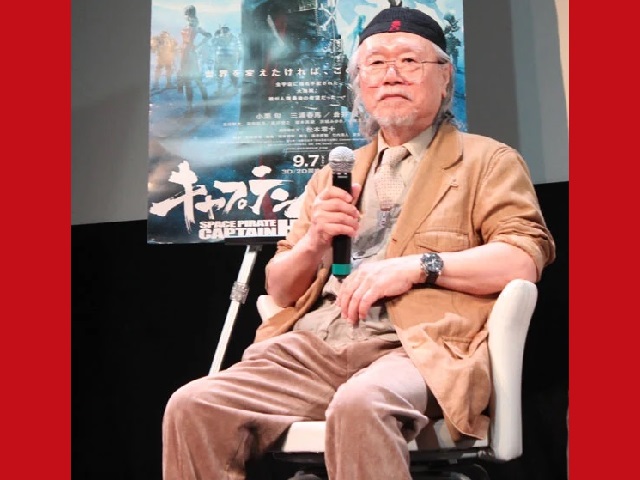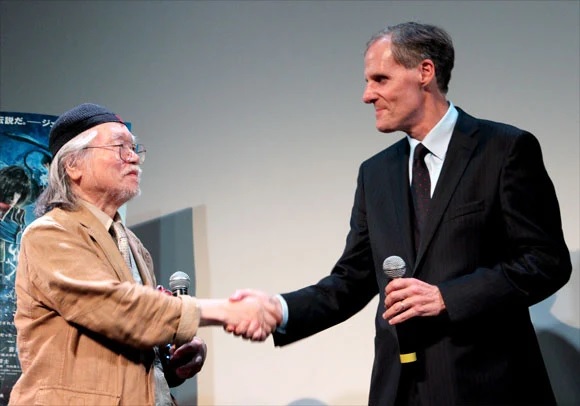
The father of space opera anime leaves fans with an inspiring farewell message.
With the rapid rate at which the anime/manga industry churns out new series, there are a lot of creators for fans to keep track of, but few names are bigger than Leiji Matsumoto. Tetsuwan Atom/Astroboy author Osamu Tezuka is often referred to as the “god of manga,” but Matsumoto is, unquestionably the father of space opera and interstellar science fiction manga.
Sadly, Matsumoto’s production studio, along with publisher Toei, have announced that the artist passed away on the morning of February 13 at a hospital in Tokyo as a result of acute heart failure. He was 85 years old.
▼ Video of Matsumoto painting Captain Harlock, one of his most iconic characters
「宇宙戦艦ヤマト」や「銀河鉄道999」など、宇宙や冒険をテーマにした壮大なSF作品で知られる漫画家の松本零士さんが2月13日、急性心不全のため亡くなりました。
— NHKニュース (@nhk_news) February 20, 2023
85歳でした。https://t.co/dKWk34m36Q#nhk_video pic.twitter.com/tQjWOU99zN
Born in Fukuoka prefecture in 1938, Matsumoto made his professional manga debut at just 15 years old. It would take until the mid-1970s for him to really hit his stride, though. In 1974, Matsumoto began drawing Space Battleship Yamato, and in 1977 he would debut two more all-time classics, Space Pirate Captain Harlock and Galaxy Express 999. Compared to the straightforward adventure stories for young children that had composed most of the previously available science fiction manga, Matsumoto’s works a more melancholy, mature look at the tolls of conflict among the stars and intergalactic odysseys. Galaxy Express 999, in particular, starts as a story of young boy’s quest to become stronger in order to take revenge against his mother’s murderers, only for his travels down that path to lead to soul-searching questions of what makes us human.
▼ The Galaxy Express 999 theme is also one of the handful of anime songs that virtually everyone in Japan recognizes, regardless of whether or not they’re an otaku.
https://twitter.com/Lrigkseulb/status/1555158403458416641With three hits coming in such close proximity, Matsumoto was the driving force of science fiction anime in the ‘70s, and that prestige allowed for lengthy TV and lavish theatrical anime adaptations. These were also some of the first anime to gain fandom footholds overseas in Europe and the U.S., with Yamato being localized for English-speaking audiences as Star Blazers. As proof of Matsumoto’s enduring popularity outside Japan, 2003 saw the creation of the Japanese/French co-production Interstella 5555, an hour-plus combination of Matsumoto-supervised and inspired anime imagery paired with Daft Punk’s Discovery album.
▼ Matsumoto shaking hands with French ambassador to Japan Christian Masset at a promotional event for the live-action Harlock movie in 2013
▼ A Galaxy Express 999 manhole cover in Kita Kyushu City, in Matsumoto’s hoe prefecture of Fukuoka
The official Twitter account of Matsumoto’s production company, Leiji Company, posted the following:
“On February 13, 2023, manga artist Leiji Matsumoto departed from a Tokyo hospital on a journey to the sea of stars.
We would like to sincerely thank all of the fans who have supported him over the years.
‘We’ll meet again at that far-off point where the wheel of time touches,’ he always said.
We will believe in those words, and look forward to that day.”
It’s an inspiringly optimistic farewell message from an artist whose works have done so much to inspire the generations who came after him, and whose legacy will continue to do so into the future.
Source: NHK News Web
Photos ©SoraNews24
● Want to hear about SoraNews24’s latest articles as soon as they’re published? Follow us on Facebook and Twitter!



 Fans leave flowers at statues of Maetal, Harlock following death of manga creator Leiji Matsumoto【Pics】
Fans leave flowers at statues of Maetal, Harlock following death of manga creator Leiji Matsumoto【Pics】 Leiji Matsumoto begins project to build real Galaxy Express 999
Leiji Matsumoto begins project to build real Galaxy Express 999 Tokyo luxury hotel offering special Galaxy Express 999 anime guestroom
Tokyo luxury hotel offering special Galaxy Express 999 anime guestroom Izumi Matsumoto, creator of Kimagure Orange Road manga/anime, passes away in hospital
Izumi Matsumoto, creator of Kimagure Orange Road manga/anime, passes away in hospital Evangelion creator Hideaki Anno returning to anime with new project for 50-year-old franchise
Evangelion creator Hideaki Anno returning to anime with new project for 50-year-old franchise Starbucks Japan unveils new sakura cherry blossom collection for hanami season 2026
Starbucks Japan unveils new sakura cherry blossom collection for hanami season 2026 Kyoto raises hotel accommodation tax to fight overtourism, travelers could pay up to 10 times more
Kyoto raises hotel accommodation tax to fight overtourism, travelers could pay up to 10 times more Sakura Festival in Chiyoda mixes illuminations, boats, music, and Rilakkuma in the heart of Tokyo
Sakura Festival in Chiyoda mixes illuminations, boats, music, and Rilakkuma in the heart of Tokyo Viral Japanese cheesecake from Osaka has a lesser known rival called Aunt Wanda
Viral Japanese cheesecake from Osaka has a lesser known rival called Aunt Wanda New smartphone game turns car models into anime girls with model-worthy looks
New smartphone game turns car models into anime girls with model-worthy looks We eat 13 of the most highly recommended sushi items at Sushiro and pick the best of the best
We eat 13 of the most highly recommended sushi items at Sushiro and pick the best of the best Tokyo Station staff share their top 10 favorite ekiben
Tokyo Station staff share their top 10 favorite ekiben New zombie ship sets sail in Japan, includes Shinkansen tickets and all-you-can-eat sushi
New zombie ship sets sail in Japan, includes Shinkansen tickets and all-you-can-eat sushi Starbucks opens outside Imperial Palace with a Frappuccino you can’t get anywhere else in Japan
Starbucks opens outside Imperial Palace with a Frappuccino you can’t get anywhere else in Japan Your search for free-to-use photos of buff shirtless Japanese dudes in a hotel is over!【Photos】
Your search for free-to-use photos of buff shirtless Japanese dudes in a hotel is over!【Photos】 Starbucks Japan releases first-ever Hinamatsuri Girls’ Day Frappuccino
Starbucks Japan releases first-ever Hinamatsuri Girls’ Day Frappuccino Japanese restaurant chain serves Dragon Ball donuts and Senzu Beans this spring
Japanese restaurant chain serves Dragon Ball donuts and Senzu Beans this spring Japan Extreme Budget Travel! A trip from Tokyo to Izumo for just 30,000 yen [Part 1]
Japan Extreme Budget Travel! A trip from Tokyo to Izumo for just 30,000 yen [Part 1] Highest Starbucks in Japan set to open this spring in the Tokyo sky
Highest Starbucks in Japan set to open this spring in the Tokyo sky Japan’s craziest burger chain takes menchi katsu to new extreme levels
Japan’s craziest burger chain takes menchi katsu to new extreme levels Japan Extreme Budget Travel! A trip from Tokyo to Izumo for just 30,000 yen [Part 2]
Japan Extreme Budget Travel! A trip from Tokyo to Izumo for just 30,000 yen [Part 2] Japan has only one airport named after a samurai, so let’s check out Kochi Ryoma【Photos】
Japan has only one airport named after a samurai, so let’s check out Kochi Ryoma【Photos】 Japanese drugstore sells onigiri at pre-stupid era prices, but how do they compare to 7-Eleven?
Japanese drugstore sells onigiri at pre-stupid era prices, but how do they compare to 7-Eleven? Which convenience store onigiri rice balls are the most popular? Survey reveals surprising results
Which convenience store onigiri rice balls are the most popular? Survey reveals surprising results Japan’s newest Shinkansen has no seats…or passengers [Video]
Japan’s newest Shinkansen has no seats…or passengers [Video] Starbucks Japan releases new sakura goods and drinkware for cherry blossom season 2026
Starbucks Japan releases new sakura goods and drinkware for cherry blossom season 2026 Foreigners accounting for over 80 percent of off-course skiers needing rescue in Japan’s Hokkaido
Foreigners accounting for over 80 percent of off-course skiers needing rescue in Japan’s Hokkaido Super-salty pizza sends six kids to the hospital in Japan, linguistics blamed
Super-salty pizza sends six kids to the hospital in Japan, linguistics blamed Starbucks Japan unveils new sakura Frappuccino for cherry blossom season 2026
Starbucks Japan unveils new sakura Frappuccino for cherry blossom season 2026 Foreign tourists in Japan will get free Shinkansen tickets to promote regional tourism
Foreign tourists in Japan will get free Shinkansen tickets to promote regional tourism The 10 most annoying things foreign tourists do on Japanese trains, according to locals
The 10 most annoying things foreign tourists do on Japanese trains, according to locals Take a trip to Japan’s Dododo Land, the most irritating place on Earth
Take a trip to Japan’s Dododo Land, the most irritating place on Earth Naruto and Converse team up for new line of shinobi sneakers[Photos]
Naruto and Converse team up for new line of shinobi sneakers[Photos] Is China’s don’t-go-to-Japan warning affecting the lines at a popular Tokyo gyukatsu restaurant?
Is China’s don’t-go-to-Japan warning affecting the lines at a popular Tokyo gyukatsu restaurant? Survey asks foreign tourists what bothered them in Japan, more than half gave same answer
Survey asks foreign tourists what bothered them in Japan, more than half gave same answer Japan’s human washing machines will go on sale to general public, demos to be held in Tokyo
Japan’s human washing machines will go on sale to general public, demos to be held in Tokyo Starbucks Japan releases new drinkware and goods for Valentine’s Day
Starbucks Japan releases new drinkware and goods for Valentine’s Day We deeply regret going into this tunnel on our walk in the mountains of Japan
We deeply regret going into this tunnel on our walk in the mountains of Japan Studio Ghibli releases Kodama forest spirits from Princess Mononoke to light up your home
Studio Ghibli releases Kodama forest spirits from Princess Mononoke to light up your home Major Japanese hotel chain says reservations via overseas booking sites may not be valid
Major Japanese hotel chain says reservations via overseas booking sites may not be valid Put sesame oil in your coffee? Japanese maker says it’s the best way to start your day【Taste test】
Put sesame oil in your coffee? Japanese maker says it’s the best way to start your day【Taste test】 No more using real katana for tourism activities, Japan’s National Police Agency says
No more using real katana for tourism activities, Japan’s National Police Agency says Retro reveals: Men choose the top ten anime series of the 1970s
Retro reveals: Men choose the top ten anime series of the 1970s